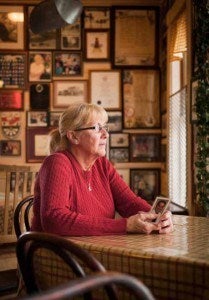[ Spring 2013 ]
Survivor profiles
“He was struggling with nightmares.”
 Emily Frazier’s 21-year-old husband, Ryan Frazier, shot himself with a semiautomatic in November 2008, soon after bringing a lawsuit against a priest who had molested him during his teenage years. Emily, pregnant at the time with their second child, is now the single mother of a 5-year-old son and a 3-year-old daughter. She works in human resources. The priest was convicted in 2007 and sentenced to 30 days in jail.
Emily Frazier’s 21-year-old husband, Ryan Frazier, shot himself with a semiautomatic in November 2008, soon after bringing a lawsuit against a priest who had molested him during his teenage years. Emily, pregnant at the time with their second child, is now the single mother of a 5-year-old son and a 3-year-old daughter. She works in human resources. The priest was convicted in 2007 and sentenced to 30 days in jail.
Ryan and I met in high school and married right out of high school. He was friendly, genuinely cared about everybody. He was one of the top five salespeople in the country for Verizon. He had a business card collection that I still have, it’s five or six inches thick. People would write down their number and they would want to meet up with him again, because he was so kind.
He was very young, handling a lot of responsibilities, working really hard, with the sleep deprivation of having an infant. And he had struggled with nightmares since the incident with the priest.
Ryan had never used a gun before. The police report said he had fired test shots out the window of the car. After he died, I walked into the gas station where he had bought the gun, and the owner was there. I asked him about the process for selling a gun and if they ever screened people for mental illness. Then I said, “My husband bought a gun here and shot himself.” The owner said just a couple of words. I couldn’t read his emotion. I don’t know if he was uninterested or shocked. He didn’t say he was sorry.
“I couldn’t tell people that my father had died of suicide.”
 Kristyn Bernier is a detective in Portsmouth, New Hampshire. Her father, Bruce Rogers, a dentist in Connecticut, shot himself in August 2003, at the age of 63. He had suffered for years from undiagnosed depression. Rogers used an antique hunting rifle that had been in the family. Late one evening, after several rounds of drinks, he surreptitiously took cartridges from an open box of ammunition on a neighbor’s refrigerator.
Kristyn Bernier is a detective in Portsmouth, New Hampshire. Her father, Bruce Rogers, a dentist in Connecticut, shot himself in August 2003, at the age of 63. He had suffered for years from undiagnosed depression. Rogers used an antique hunting rifle that had been in the family. Late one evening, after several rounds of drinks, he surreptitiously took cartridges from an open box of ammunition on a neighbor’s refrigerator.
My father had a great sense of humor. He had a thriving dental practice. Volunteered all over the place, he was on every board. In his spare time, he refinished furniture. He made baskets, caned chairs. Those beautiful chairs–I have a couple of them. But he was lonely. Things changed around him, we all changed, and he didn’t.
I am a master at dealing with crisis. I’m a hostage negotiator. I was an EMT for 25 years. I handle child sexual assault cases. I handle felony domestics. I interview predators day in and day out. I have seen the most horrible things people do to each other. But I missed this crisis in my own family.
I couldn’t tell people that my father had died of suicide. I came up with creative ways to answer the question of how he had died. “He died suddenly”–that was my answer. Even in my line of work, suicide is a stigma. And if people aren’t willing to talk about suicide after it happens, how do you expect them to talk about the risks beforehand?
“A club I never wanted to join.”
 Janyce Demers is a school lunch worker in Hooksett, New Hampshire. Her 23-year-old son, Zachary Demers, killed himself with a firearm in 2008–hours after a first drunken driving arrest. Zachary may have been afraid of losing his commercial driver’s license, a great source of pride and accomplishment.
Janyce Demers is a school lunch worker in Hooksett, New Hampshire. Her 23-year-old son, Zachary Demers, killed himself with a firearm in 2008–hours after a first drunken driving arrest. Zachary may have been afraid of losing his commercial driver’s license, a great source of pride and accomplishment.
Being a suicide survivor is a club I never wanted to join. But it wasn’t my choice. Zach’s death was a shock to all of us. He was happy-go-lucky, loved his family, loved his sisters, loved his nephews and nieces. But he thought he was in over his head financially. And he was still living at home–that was a bother to him. To have even considered suicide, he must have been so low, just beyond anything.
I went back and looked through all his school papers. What stood out in his teachers’ comments was his impulsiveness. Being impulsive, you sometimes make rash decisions, spur-of-the-moment, and they don’t always turn out for the best.
There were guns in our home. My husband has hunting rifles. My daughter and my son-in-law have guns for target practice. Zach had purchased his own firearm for hunting and target practice. That being said, I am not a gun lover–I really don’t care for them. But I’m also not anti-gun. I believe there are people who can be trusted with guns for the right purposes.
Today, if I notice anyone in trouble, I don’t step back and assume it’s none of my business. I approach them and say, “Hey, are you thinking of doing this?” I’ll ask them directly, “Do you have a gun?” I’ve experienced it and I’m no longer afraid to ask. People need to know that help is available.